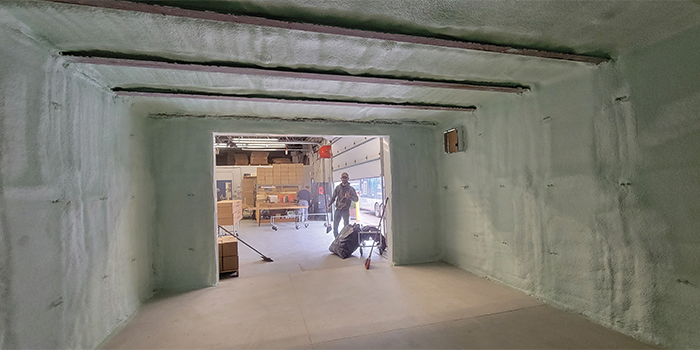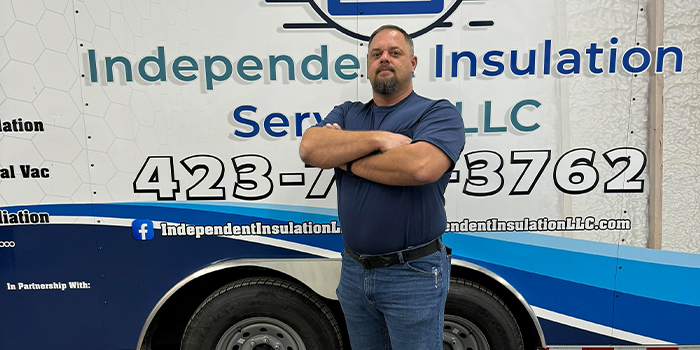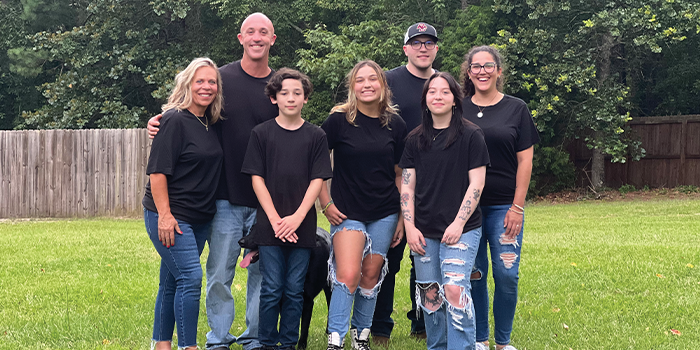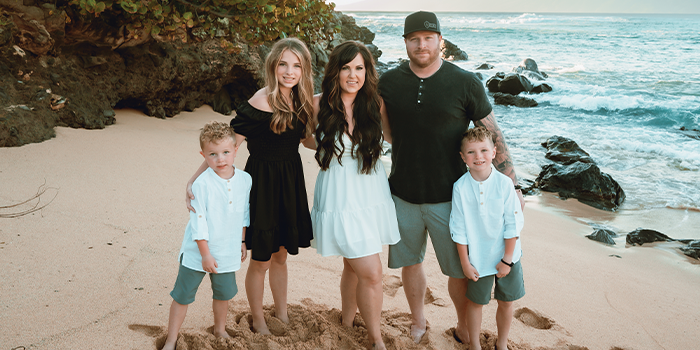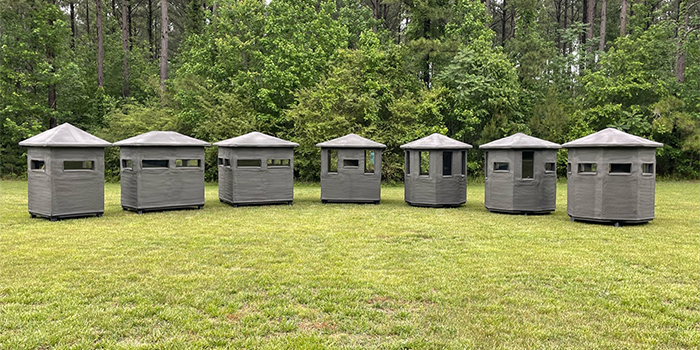
Cozy Camouflage

SPRAY FOAM MAGAZINE – Many of the best businesses belong to owners who are both passionate about their products, and intimately familiar with their customer’s wants and needs. Todd and Jerranna Cannady of Hunter’s Comfort, LLC in Franklinton, NC, exemplify this commitment to excellence. Hunter’s Comfort produces insulated deer blinds via a patented process that Todd Cannady, a hunter himself, has continually developed and perfected over the years. Cannady understands all too well the challenge of waiting for hours in a rickety deer stand without protection from the elements. He combined his 16 years of experience as an insulation professional with his passion for hunting to create a deer blind that is sealed, airtight, and insulated thanks to the layer of closed-cell spray foam encapsulating it.
The Cannady’s officially launched Hunter’s Comfort in 2013, but even before securing a business license and a process patent, Todd was experimenting with how to enhance his own hunting experiences. He began experimenting with creating deer blind prototypes as early as 2007, after being struck by inspiration one day while driving. He saw a ramshackle deer hunting blind on the side of the road, and wondered what it would take to insulate a structure like that.
Todd’s 16-year career as an insulation professional provided him with knowledge and curiosity about how to make structures energy efficient. Soon enough, he had created the first simple prototype for The Rack Shack, a simple, insulated deer blind model: it’s a small structure framed like a house, but with the exterior walls, roof, and floor coated in a layer of closed-cell spray foam. Cannady describes the prototype model as “the ugliest thing you ever saw.” The earlier model’s aesthetic flaws didn’t deter him or his buddies from using the blinds out in the hunting field. One of his first customers was a friend and fellow hunter, who was unbothered by the blind’s less-than-chic appearance and purchased two prototype models.
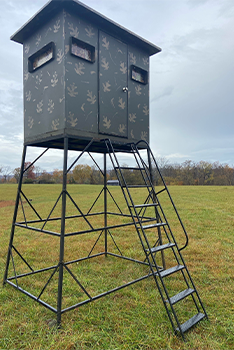
This warm reception from friends, family, and his coworkers indicated that the Cannady’s were on to something with their product ideas, and Todd continued to refine his designs. After a few years, it became clear that there was a high demand for insulated deer blinds, and the Cannady’s decided to make their business official.
During Hunter’s Comfort’s first year in business, they sold 22 blinds, thanks to a combination of attending hunting shows and word of mouth. Realizing that their fledgling business showed no sign of slowing, they acquired a shop, a process patent, and a few employees. Acquiring the patent was no easy task, but they were encouraged to secure one to protect their business against opportunists. At first, they were rejected for a product patent, but after speaking with a lawyer, they acquired a patent on their specific process, successfully cornering the market on sports-utility buildings insulated with spray polyurethane foam. Keeping up with their ever-increasing business volume is a team effort, and today, they have three full-time employees, in addition to themselves. Todd oversees production, while Jerranna manages the bookkeeping and marketing efforts. Their crew is small, but their process is efficient, and on average they can build around five blinds a day inside their shop in Franklinton.
Hunters use blinds as temporary shelters to prevent game from detecting them. Blinds come in different shapes, sizes, and designs, though many on the market are portable and rather flimsy, and meant to be replaced after a few years. Though all blinds are meant to visually camouflage the hunters inside them, most blinds are not smell proof, which means prey may still avoid the area because they can smell the hunter even if they cannot see them. In contrast, Hunter’s Comfort blinds are insulated, smell proof and soundproof, which completely prevents deer and other game from detecting hunters.
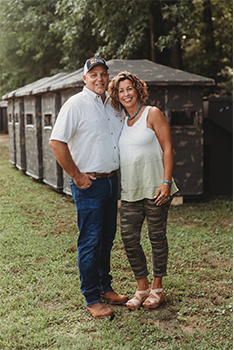
Hunter’s Comfort owners Todd and Jerranna Cannady
Though the design and process vary by model, all the blinds are stick-built, designed like a small-scale house. After framing the blind, they apply approximately one inch of Huntsman FL 2000-R regular 2lb set closed-cell spray foam. The spray foam on the exterior serves as a water barrier and insulation from the elements. The blinds feature slidable windows with quarter of an inch thick acrylic panes lined with felt for added quietness. All standard (non-metal) models receive a coating of UV-resistant exterior paint, the kind you can find at your local hardware store. Applying exterior paint over the foam extends the life and longevity of the blind, and Cannady urges customers to repaint the blind every few years as needed. The blind’s painted spray foam exterior elevates comfortability inside the blinds, and reduces detection outside the blinds, allowing hunters to catch more game by increasing the amount of time they can stay out in the field.
The benefits of insulating deer blinds with spray foam far exceeded Cannady’s own expectations. “When you’re hunting deer, the main thing you want to avoid is the nose of the deer.” Cannady explains. “These blinds are so airtight, you don’t have to worry about scent, and the longer you can stay out in the woods, the better chance you’ve got of harvesting that deer you’re targeting.” Hunter’s Comfort deer blinds also make hunting more accessible for those who might not otherwise be suited for it – for example, parents can bring their children hunting, because the soundproof nature of the Hunter’s Comfort blind means that kids can experience the thrilling parts of hunting while reducing the more unpleasant parts, like being quiet and still for long periods of time.
Despite all the benefits of insulating deer blinds with SPF, there were some unexpected obstacles. It turns out human customers aren’t the only admirers of Hunter’s Comfort’s handiwork; bears and other wildlife also admire the craftsmanship. Cannady recalls reports from customers about bears scratching off bits of spray foam from the blinds, or woodpeckers drilling into the material. When searching for solutions to this issue, Cannady consulted a biologist, who explained that certain types of foam may emit an ultra-subtle odor, much like the odor from ant colonies – an odor that curious bears find attractive. They solved this wildlife issue by covering the blind’s foam exterior with wildlife-proof metal plating, creating highly fortified blinds specifically designed for customers in bear country. The metal-plated deer blinds are a prime example of Hunter’s Comfort’s commitment to continually upgrading their products in response to customer feedback to create the best deer blind the industry has ever seen.
Get Your Deer Blind
Purchasing a Hunter’s Comfort deer blind is easy because they offer national shipping for those buying from their online catalog. They have shipped their blinds as far as Wyoming and Idaho and have also shipped blinds to customers in Canada. Though they do not have a showroom, they do have partnerships with licensed hunting supply dealers throughout the southeast, with the highest concentration of dealers located in North Carolina. But if curious customers ever want to stop by their shop and have a look around, they always have models on hand to show off. For more information: www.hunterscomfortusa.com
For use by SprayFoamMagazine.com & Spray Foam Magazine



